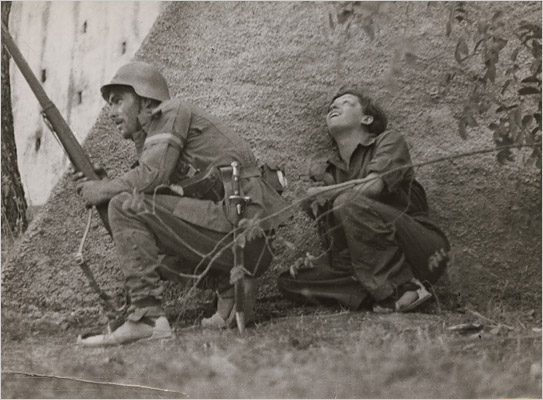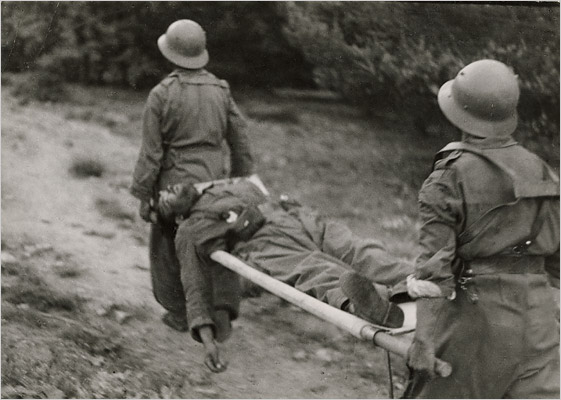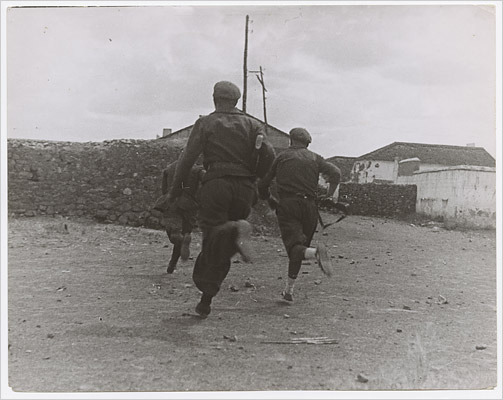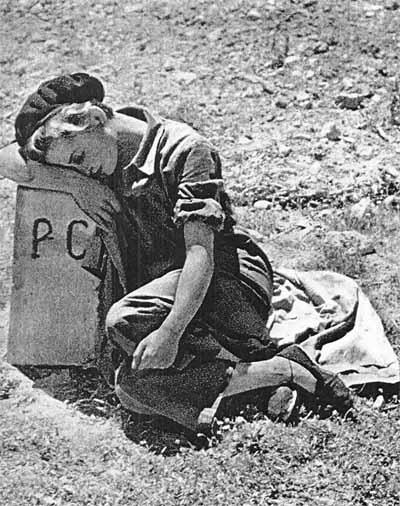| I thought she meant I had woman's eyes.
She touched my cheek, then lay back and burst out,
"I'm not going to fall in love again! It's too painful." She sounded
irritated.
"What do you mean?"
"I loved someone. A boy in Prague. Killed by
the Nazi. It's too painful." She took a deep breath.  . .
"You don't love Capa?" I asked, puzzled.
"I do love Capa, but not the way I loved Georg.
I don't want to love anybody like I loved Georg. Capa is my friend, my copain."
She looked at the ceiling. I studied her small nose
and perfect mouth, her golden-red hair. Our bodies still were not touching. I
moved away from her quickly when my hip touched hers. I tried not to move or make
a sound. I hadn't understood what she was saying. I didn't understand anything
that afternoon. We lay like that for many long seconds. Then she placed her hand
on my stomach, looked at me with a serious expression, and moved her hand to my
thigh, near my groin.
"Do you like being
touched here?"
I nodded, quickly, twice.
I held my breath. She took my hand and placed it in her groin. "I like to
be touched there too."
I caressed her gently,
carefully, hardly moving. Then I withdrew my hand and stared at the ceiling again.
We lay there, neither of us moving. "She's
Capa's girl," I thought. "He placed her in my charge." We had been
dear friends for a month now, she and I. I wondered if it might be alright to
turn and gently kiss her on the cheek like a friend, but I didn't dare.
She
turned on her side and studied me. "You're incredible," she said. She
sat up. "I'd better dress." She looked at me, touched my cheek, bent
down and kissed my forehead, smiling a smile I did not understand. She kept glancing
at me.
"Why is she looking so sad?"
I asked myself
She got out of bed and started
dressing. I lay still on the bed, numb.
She
finished dressing. I put on my shoes, and sat there. "Are you going to marry
Capa?"
She shook her head. "I told
you, he's my copain, not my lover. He still wants us to marry, but I don't want
to."
I sat on the edge of the bed unable
to move. She stood in front of me. I felt like crying, and smiled to hide it.
She touched my head. I said, "He acts like you are lovers. He put you in
my charge. He asked me to take care of you."
She
sighed. "Yes. He was clever. He saw how I looked at you."
I
heard myself saying, "My mother will love you."
"I
don't want to live in Montreal," she answered. "We'll live in New York."
We said no more, but went to dinner.
I
think I was in shock.
Capa wired from Paris that he might have to travel
to China. Gerda thought she might visit him in Paris before he left. Maybe she
would go to China with him. Maybe I would join her in Paris before she left or
when she got back. Nothing was settled. Everything was possible.
Sunday
morning, July 27, 1937, the sun burst through my window and woke me up before
Gerda phoned. I could hear the Madrilenos going to work. Women carrying baskets
hurried to get a good place in the food queues. The morning papers lay on my bed
and I read that there had been heavy fighting yesterday near Brunete. The village
of Brunete had been entered twice by the fascists and retaken twice by our troops.
The situation was in flux.
The telephone rang.
Gerda had arranged to have a car take her to the front at Brunete. Did I want
to come?
Gerda was waiting beside the car. She wore khaki overalls and
her reddish hair was all over the place.
The
driver was French. He could speak American, not English. "Okeedokee"
was the word he knew. The sun became stronger and the car became hotter. "Let's
sing," sang Gerda. "Okeedokee," sang our chauffeur.
We
sang songs in many languages till we got tired of singing.
Gerda
stretched her arms and yawned happily. "Well, I must get some good pictures
to take to Paris. If they are still fighting near Brunete it will be my chance
to get some action pictures."
"Let's
not go too close," I said.
"How do
you want me to take pictures? Long distance?"
"That's
an idea."
"Are you frightened?"
"Yes. Aren't you?"
She
laughed. "Yes." The chauffeur brought the car to a stop near
Brunete. "Okay, there!" he said pointing towards the village.
We
walked though a rolling wheat field. Everything was strangely quite.
"Where
are the lines?" I asked.
"Right in
front. In the back of the hill," Gerda answered. She had an instinct for
such matters.
"That's close," I said.
"That's good," said she.
The
General, with a few of his adjutants in tow, was walking towards his dugout. General
Walters: we had interviewed him the week before. He did not seem glad to see us
now. "Of all days to come," he groaned. "You must go away immediately.
Go back. Go right back!" He stepped forward right into my face. "Get
her away from here."
"What!"
she complained. "I am going to Paris tomorrow. This is my last chance. I
must stay!"
"No!" the General
yelled. "Take her away from here. Go immediately. I can't be responsible
for you. In five minutes there will be hell!" Then General Walker dismissed
us from his attention, and marched off to his headquarters.
"Come,"
I said.
"You can go. I'm staying."
"But the General said..."
"To
hell with the General." She was adamant. 
"Okay," I conceded, "okay. You're
crazy. Let's find some cover. There are some dugouts on the hillside there."
We snuggled into a hole barely big enough to hide
our two asses. We waited, looked around. Other soldiers were precariously dug
in around us. Then we heard the drone of planes. We could see a flight, like geese,
perhaps twelve bombers in formation. You could see the tiny pursuit planes flying
like flies around the bombers. Their drone became louder, became a roar. They
moved so slowly, one felt they might stop in mid-air. They didn't stop. They disgorged
their shit on us. The bombs fell so quickly. Then it thundered, black clouds billowing,
about a hundred yards in front of us. It thundered again and again.
Gerda
was busy taking pictures. I was trying to see what I could use to dig the hole
deeper, while the thunder roared and the earth showered around us.
"Put
your head down!" she yelled at me.
"Where'll
I put it? I can't put it into my chest."
"Put
it down! Put it down!"
I don't think I
can find words to fit the confusion and the fear, dirt, dust, the acrid smoke.
And then the air cleared. The stuttering drone of the planes became dimmer.
"Are you all right?" I asked.
"Who
me? Sure. You?"
"Sure."
Heads began to appear from the foxholes, soldiers,
some grinning, some grim. But all to soon the planes returned. Their drone grew
again to a roar. In relays they bombed the government lines, bombed us for an
hour or more. Meanwhile the artillery shell came too without interruption. It
was three o'clock when the bombardment had started. Now, an eternity later, it
was suddenly quiet. Gerda asked me the time. "Four."
We
must have looked ludicrous trying to hide in that shallow hole. I'm sure my head
and ass showed above the ground. Gerda somehow managed to get her feet underneath
mine, but that was little protection.
"If
they come again you had better watch your head," she said. "Shrapnel,
you know."
"I know. But you're taking
pictures and your head is above the ground."
"Yes,
but I must take pictures and you don't have to."
Again
we heard the drone of aircraft, this time, though, with a different timbre. A
flight of bi-planes flying low swung towards the road not far behind us. Gerda
clicked her Leica.
The first plane turned
on its side and bellied in low. We heard the rat-tat-tat of machine gun fire.
One by one the bi-planes strafed us, nine planes in all, and with barely an interruption
the first came back to make a second pass. Then the bombers came and bombed the
lines again, and still the artillery shells fell round us. "It must end sometime,"
I said to break out of my shock. Gerda didn't answer. She took pictures of the
smoke and black earth which heaved with each bomb. She took pictures of the dust
and white smoke which came from the shells. She took picture after picture, and
I crouched there.
Suddenly she said with urgency,
"Scheise! Put your head down." The planes swung right at us. They must
have seen her camera flashing in the sun. It had become personal. We were their
specific target. The lead plane came gently towards us. There was a surge to the
sound of its engine, and a stuttering flashing through the propellers, and the
earth in front of our foxhole jumped in spurts. Gerda, unshaken, took pictures
of the planes as they came down on and over us.
"Yesus,
the roll is finished." She rolled on to her back, and started to change films.
The planes roared over just a few yards above us. Gerda's movie camera, in its
leather case, lay just beside the foxhole I grabbed for the movie camera and held
it above her head to protect her from the machine gun bullets. "Don't be
silly," she hissed. "I may lose my film." But the earth from the
strafing flew all over us, splattering us, and she allowed me to continue holding
the camera over her head..
I wanted something
to protect my face. I grabbed a clod of earth and held it on my head. I heard
a suppressed giggle. Gerda's body was shaking. "If you could only see yourself,"
she laughed.
The nightmare continued: bombs,
machine-guns, shells. Cacophony. At about half past five, suddenly on the slope
in front of us we saw men running back towards us. They were retreating all up
and down the line. If that were possible, it seemed the bombardment intensified.
We saw men blown into the air, just like in the movies, but real, just there in
front of us. You could touch it. Gerda put another roll into her Leica and rolled
over to shoot the onrushing retreat. I felt desperate. I didn't know what was
more maddening then, the planes or her camera.
One
section of the lines was orderly and the retreat went comparatively smoothly.
 But
a retreat is a retreat, and even though it was not a rout, there was confusion.Men
got panicky and ran anywhere as long as they ran. In front of us a few took position
with there guns pointed back towards the enemy, and seemed to dare anyone to pass
them. This stopped the panic. The lines reformed. But
a retreat is a retreat, and even though it was not a rout, there was confusion.Men
got panicky and ran anywhere as long as they ran. In front of us a few took position
with there guns pointed back towards the enemy, and seemed to dare anyone to pass
them. This stopped the panic. The lines reformed.
"Come,
for godsakes," I pleaded.
"Not now
while the planes are still strafing. It would be silly to go now. It will be quiet
soon. And anyways, I have one roll left."
It
was quiet. Very quiet. Here and there a figure moved. A cool breeze came down
from the mountains. The wheat swayed gently.Above the hills clouds puffed and
drifted by in a azure sky. The countryside looked serene.
"Come,
lets go," she said abruptly.
"What?"
"Yes, I'm tired."
We got out of our rut, our foxhole. We walked back
through a meadow away from the front. The division's doctor, a blond haired man
in a bloodied uniform, overtook us. He looked worn out. All his equipment had
been lost in the retreat. We spoke in English, he with a Scottish accent, as we
walked through the fields towards Villanueva de la Canada. The lines had reformed
between the two villages, Brunete and Villanueva. We joined and followed the road.
Beside the road lay the dead and wounded. Some groaned and begged for water. Some
lay silent. Gerda had no more film.
The planes
came again. We flung ourselves underneath an overturned truck. But the planes
passed over. They weren't looking for us.
We
reached Villanueva de la Canada. It stank.Two men were sitting beside a wounded
comrade.
"Please come. Our friend is badly
hurt."
The doctor was tired. "I've
got nothing. Nothing. No bandages. Nothing."
"Please
look at him."
The doctor went over to the
wounded soldier and lifted the blanket. The legs looked as if they had gone through
a meat-grinder. The man made no sound.
A tank
passed - one of ours, of course - we stopped it, and put the wounded man on it,
and then jumped on ourselves. There were four tanks behind us. Clumsy looking
animals. Some planes came flying over again. They dived. Tat-tat-tat-tat.
"Silly getting killed now after going through
what we did."
"Bah, they can't hit
a thing," said Gerda.
The tank was hot.
It snorted and wheezed, made lots of noises, and swung from side to side. We held
on tightly.
A white house beyond Villanueva
served as a dressing station. We took the wounded man off the tank. The doctor
found a car, and rushed away to get ambulances. Not rational, that. Anyone could
have gone on that errand, and he could have stayed with the wounded. The wounded
were dragging themselves, or being carried, to the dressing station. The five
tanks we had come with had stopped right beside the medical station. That was
silly. A marvellous target for planes.
"Got
the camera?" Gerda asked.
"Yes."
A large black touring car came down the road. We
stopped it and asked for a lift as far as El Escorial.
"Sure,
get on."
We jumped on the running board.
"Gerda, you go on the other side."
"Why? It is big enough. We can both stay here."
She put her cameras on the front seat of the car.
There were three wounded men inside. "Salud."
"Salud."
She
took a deep breath. "Boy, that was a day. I feel good. The lines reformed.
I got wonderful pictures. And you? You have a good story, yes?" she shouted
above the wind.
"Yes, but next time I cover
the war from the press office. I can describe it better in comfort."
"Tonight we'll have a farewell party in Madrid.
I've bought some champaigne. Then perhaps we'll see each other in Paris. In any
event, I am going to China with Capa soon."
"I'd
like to go to China too," I said.
There
was some confusion ahead of us. A tank was approaching. It had been strafed by
a Nationalist plane and was driving irratically weaving across the road. Our car
swung to the left to avoid it. "Hold on," Gerda laughed.
The
car went out of control; began to roll. Then I was on the road. Then I knew that
both my legs were off. Then I knew they weren't. I saw blood on my right leg.
And the pants torn on my left. There was no pain.
"Gerda!"
Two soldiers ran towards me and dragged me towards
a ditch.
"Donde esta mujere! Mujere! Mujere!"
Then I saw her. I saw her face. Just her face. The
rest of her body was hidden by the overturned car. She was screaming. Her eyes
looked at me and asked me to help her. But I could not move. There was no pain,
but I could not move.
The tank was quiet now.
It had swung around and now it was quiet. The young Spanish driver looked at us.
He was frightened.
The planes came. The man
beside me dropped down to huddle in the ditch. The other pulled me into the ditch.
Everyone ran for the fields.
"Gerda! Where
are you? Gerda."
The planes went by.
"Donde esta mujere?"
"She's
been put into an ambulance," someone told me.
"Are
you sure? Es Verdad?"
"Si si."
"And her camera? Where is her camera?"
"Yo no sai."
Someone
brought me a brown cloth belt. It was crumpled and the wooden buckle was broken
into little pieces. "It is hers," said the someone.
"Where
is the car?" I asked.
"Yo no sai."
Then I began to feel the pain. "Agua. Water,
I need water." But no one had water.
They
put me on a stretcher and placed me in an ambulance.
There
was no water.
The pain became heavier. I held
the brown belt in my hands.
We stopped at a
dressing station. "Did they bring a woman here, a small pretty woman with
reddish hair?"
"Woman? There was no
woman."
They gave me water. I looked at
my watch. It read six-thirty. I put it to my ear, but it did not tick. It had
stopped. "Six-thirty. That's when we were hit."
"What?"
said the man beside me.
"Nada. Como esta?"
How are you?
"Just a machine-gun bullet
in the thigh," he said.
It was growing
dark. I still held the belt in my hand. It was becoming wet from sweat. At some
point I fainted or slept. I remember someone slapping me awake. Then the hospital
at El Escorial. It was an English run hospital. I asked if they had seen a woman,
a red haired...
"Yes. Gerda Taro. Yes.
She's here. They brought her here some hours ago."
"How
is she?"
"She's all right."
"Can I see her?"
"No.
She's just had an operation. You can't see her."
They
injected anti-tetanus into my arm and marked a cross on my forehead.
"Will
I be able to see her in the morning?"
"Yes."
"How is she?"
The
English nurse smiled at me. "She's all right. She's suffering from shock
but I believe she'll be all right."
"She
needed an operation?"
"Naturally.
Why do you think we gave her one?"
"I
don't know."
A Dr. Caldwell came over to
my stretcher. "How do you feel?" he asked.
"Good.
Can I see Gerda?"
"No, I'm afraid
not. She's suffering from shock. It would be bad for her if you saw her."
"But I might be good for her. I love her. I
want to marry her."
"It would not
be good for her," he said, his mouth tightening. He told me that when she
had been brought in she had asked to send a cable to Paris, to Ce Soir and to
Capa. He had done that. The wounded lay on the floor of the hospital. All
the beds were taken. The ambulances kept unloading.
My
pain became worse. Dr. Caldwell gave me a shot of morphine. "There. Now you'll
go to sleep."
"Does she say anything?"
"Well, she asked for her camera and I told
her I hadn't seen it. When I told her you were here and were all right, she told
me to give you her regards." My watch still showed six-thirty. I asked
the time. Three-thirty. I couldn't sleep.
All
night the wounded came. The doctors worked smoothly, quickly in their triage.
Here, this one, cut free the clothes. Fracture? Abdomen? Bullet wound. Bring him
to the theatre. This one's dead? Take him away. All through the night.
"What time is it?"
"Five a.m.
Why don't you sleep?"
"I can't sleep.
Can I see her now?"
"No."
Well I would see her soon. We would joke about the
fact that we had been hit by our own tank after missing all those shells and bombs.
And she would probably raise a fuss about losing her camera. She'd probably insist
we go back to look for it. It might still be in the car. No, we probably couldn't
go ourselves. We'd have to send someone.
At five-thirty Dr. Caldwell
came to my stretcher. "Well, I think everything looks much better. We just
gave her a blood transfusion and she said 'Whee, I feel good.' She asked about
her camera again, and when I told her it was lost she said 'C'est la querre.'
She's swell."
"Can I see her now?"
"For godsakes, man, not now. She must sleep
now. If she sleeps everything will be all right. You'll see her later."
I drank some coffee. I was still holding the cloth-woven
belt in my hand, fingering the remnants of the fractured wooden buckle. It was
crushed, shattered. I tried not to think what that might mean. "I'll try
and sleep now," I said to myself. "I suppose this is a good story."
Dr. Caldwell walked towards me. "I'm afraid I have bad news for you."
I knew what he was going to tell me. "Gerda just died."
"Give
me a cigarette," I said.
He lit and handed
me a cigarette. He turned and came back with a hypodermic needle.
"No.
I don't need it. For Chrissake, I don't need it. When I need it I'll ask for it.
I feel no pain."
"You're going to
need it." He jabbed the needle into my upper arm.
I
wanted to ask if he was sure she was dead, but I didn't. I wanted to go to sleep
and forget. I could not.
A nurse came over
and told the doctor about another case, and he had to leave. "Would you like
to be taken into my room?" he asked me.
"Please,
if you can."
An antiaircraft gun began
to fire. The shutters rattled. Caldwell came back. "You'll never know how
sorry I am I didn't let you see her. But I didn't know. I really thought she would
recover."
"Oh, hell. That's all right."
"If you want," he paused. "If you
want you can see her now."
"Hell,
I don't want to see her now." But I did. I didn't believe she was dead.
They brought me upstairs on a stretcher, and I looked
at her, and her face was not quite the same.
Then
they carried me down and I kept slipping on the stretcher, and the boys carrying
me told me to hold on or I might fall. They put me in Dr. Caldwell's room.
Someone had an English cigarette and gave it to
me. The smoke curled. Then a nurse brought me Gerda's cigarette case. There was
one cigarette left. I put out the English cigarette and smoked the one in Gerda's
case. It was a Spanish cigarette, and I never liked Spanish cigarettes. The doctor
asked what I wanted to do with her body and I wanted to tell him to go to hell,
but he meant well, and I asked if he could arrange to get it to Paris. He said
he would.
Then the nurse came over and said
that she was sorry.
chapter
3
|